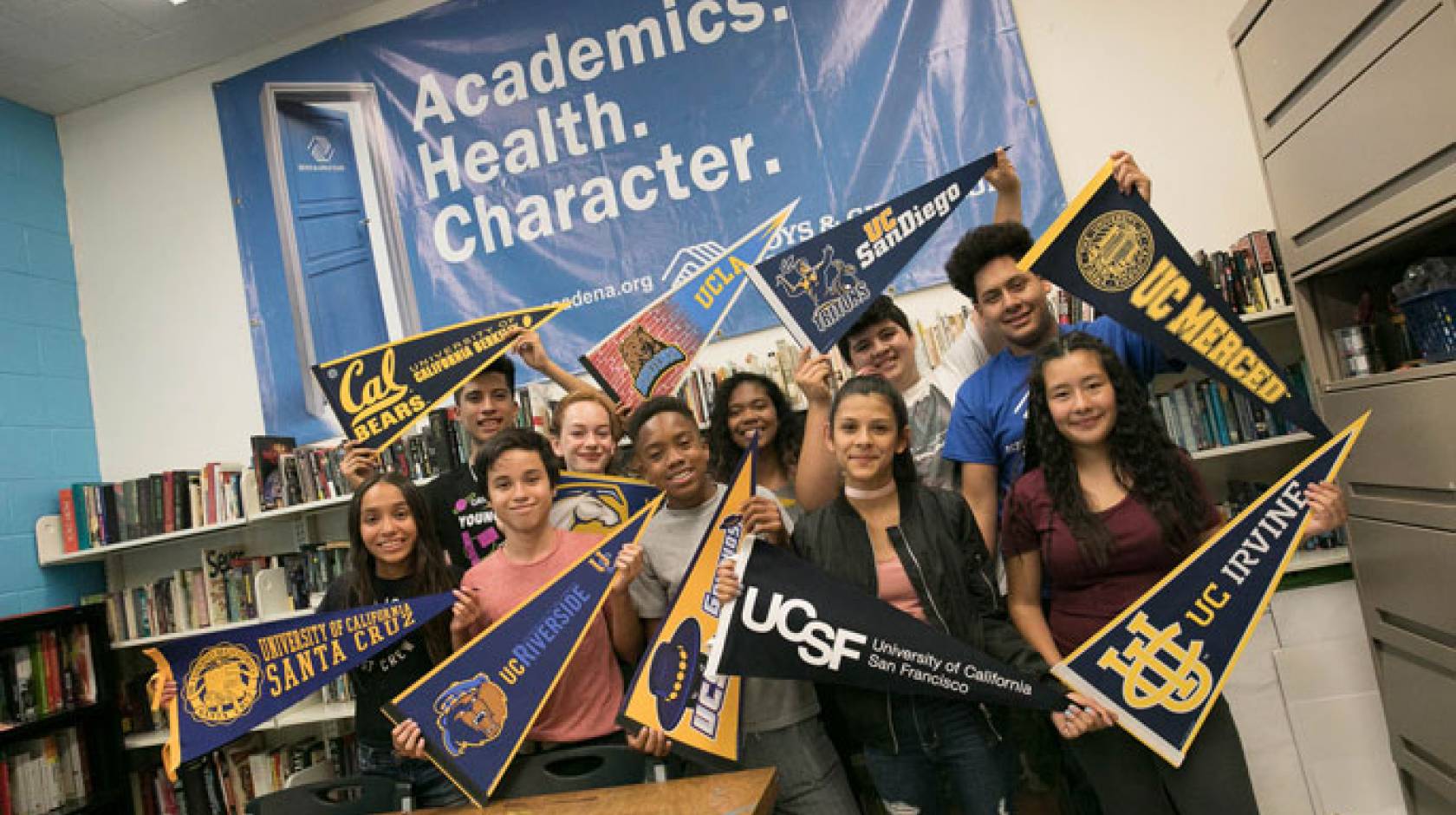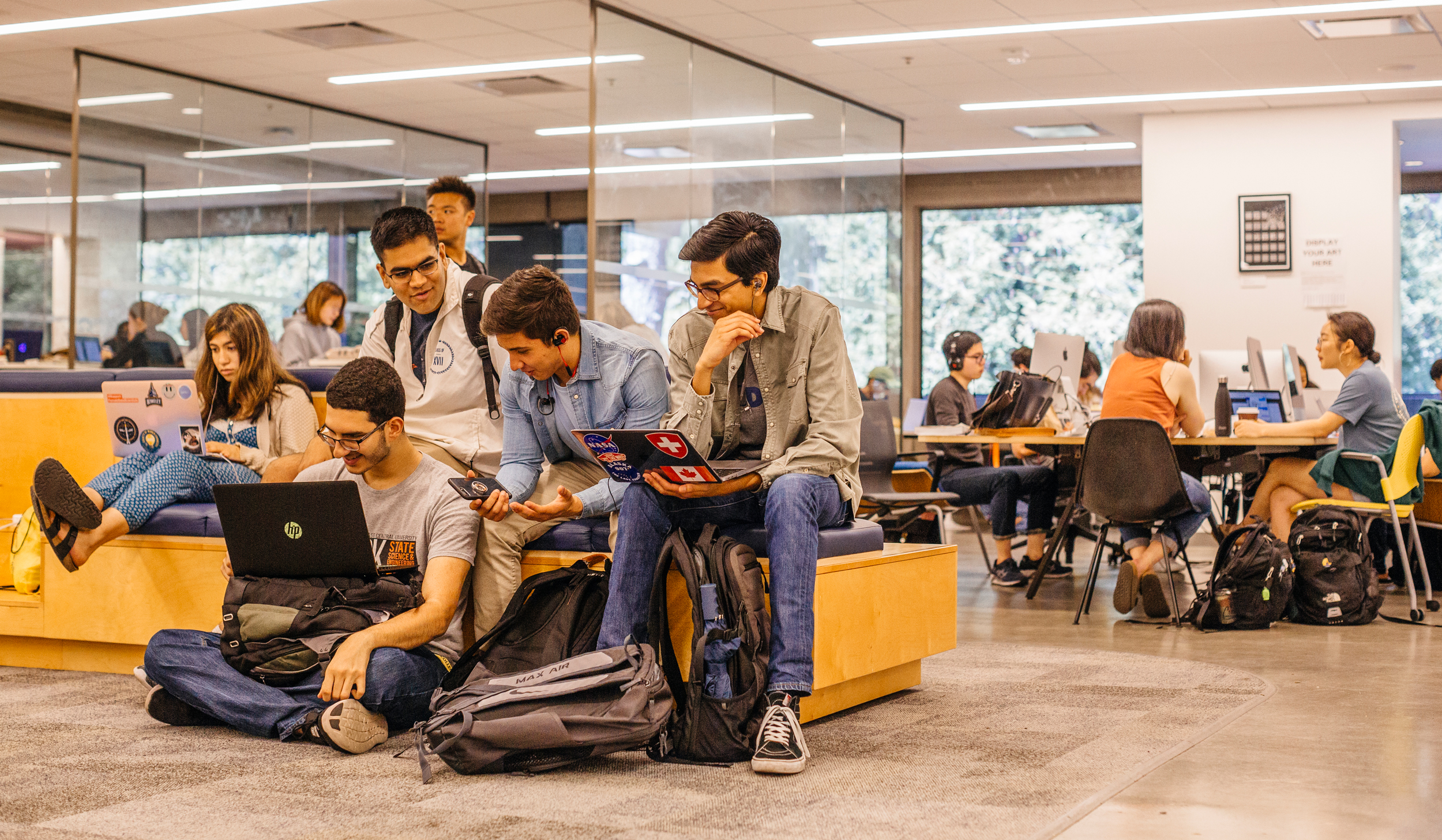Nicole Freeling, UC Newsroom

High school junior Jose Palma arrives at the Boys & Girls Club of Pasadena early most days, long before the other kids. Whatever is going on at home or school, Palma knows he’ll find a warm welcome amid the sagging, overstuffed couches and pool tables from the supportive staff in the teen room where he hangs out.
“It’s not just a place. It is family,” said the 18-year-old, who has been coming to the club since he was a tot. “The staff and friends are always there for you.”
The club has helped Palma get through difficult periods in school and focus on academics, he said.
“I used to be that kid who would mess around in class. Now I’m that kid people look up to.”
Palma, who has recently set his sights on college, will soon have extra guidance in getting there thanks to a historic new partnership between the University of California and the Boys & Girls Clubs of America.
UC is bringing its Early Academic Outreach Program (EAOP) to the Boys & Girls Clubs in Pasadena, Merced and San Francisco, where it will reach thousands of students with one-on-one academic support and college advising services.
The program, which already reaches about 42,000 California middle and high school students, has proven successful in helping participants aim for and pursue higher education.
EAOP participants are significantly more likely than their classmates to take the SAT and complete the courses they need to be eligible for a California public university. More than 60 percent of 12th-grade participants go directly on to higher education, compared to an estimated 41 percent of California public high school seniors statewide.
Now, UC is extending these valuable services beyond public schools to reach students through community organizations. The pilot project is part of UC’s larger efforts to boost college-going rates across California.
California Senate President Pro Tempore Kevin de León and UC Board of Regents Chair Monica Lozano announced the program Sept. 28 at the Pasadena club, hailing it as a model for expanding access to UC among low-income and underrepresented minority youth.
“Higher education is a passport to opportunity,” de León said. “It behooves all of us, both from a moral and an economic perspective, to ensure equitable access to higher education. This partnership with Boys & Girls Clubs of America is absolutely critical to building a more economically and culturally diverse system of higher education in California.”

Credit: Photo courtesy Reed Hutchinson
Connecting more Californians to UC
Through the partnership, three UC campuses — UCLA, Merced and San Francisco — will partner with their local Boys & Girls Clubs to offer personalized advising to teens to help them prepare for, apply and pay for college.
In its pilot phase, the program will serve an estimated 6,000 California students and their families at the Boys & Girls Clubs of Pasadena, Merced County and San Francisco. If successful, it could be expanded to include all 10 UC campuses and Boys & Girls Clubs across the state.
Through the program, UC will train Boys & Girls Club staff to coach students. Participants will also have access to SAT prep workshops, tutorials on writing strong college applications and opportunities to visit UC campuses.
They will also learn about UC’s strong financial aid program, which covers the full cost of tuition for more than half of UC’s California undergraduates. And they will find out about options for transferring to UC through a California community college.
“Even though they have the academic ability, many of our students don’t see UC as within their reach,” said Damon Williams, senior vice president of Boys & Girls Clubs of America, which serves significant numbers of low-income and minority students.
The partnership with UC, he said, is a potentially scalable model that will connect more economically vulnerable young people to a world-class university education.
“We want to strengthen college-going knowledge and get them on campuses to have those exploratory experiences that will really open the lens of possibility for them.”

Credit: Photos courtesy Reed Hutchinson
Coming full circle
Among those cheering the new partnership was UCLA’s Britanny Lewis-Porchia, an EAOP college adviser, who made many of her fondest teenage memories at the Pasadena Boys & Girls Club, where the announcement was made.
“My brother and I learned to swim here — in this very pool,” she said. “I learned leadership skills here. I learned to play chess here. I’m still friends today with the friends I made in this club.”
For her, the partnership means coming full circle — helping a new generation of “Club Kids” make their way to cap and gown.
It also offers a unique opportunity to reach kids through an organization they know and trust, free of the stresses, time constraints and peer pressures of school.
“Our kids come from all kinds of backgrounds — but they know when they walk through that door, they will have the support they need,” said teen director Steve Austin, known to the kids as Mr. Steve.
Austin doesn’t just have their backs. He's often looking over their shoulders, making sure they are going to class, helping with their homework and keeping their grades up. He goes to Back to School nights for the kids in the program to make sure he’s on top of what’s going on in their classrooms.
The result: Boys & Girls Club members have higher grades and graduation rates, on average, and are more likely to avoid drugs and other risky behaviors than peers in their communities, according to data from the organization.
What they often lack is access to practical information on the nuts and bolts of getting from high school to a four-year university or community college.
It’s a similar story for resource-strapped schools in the Central Valley.
“A lot of our high schools don’t even have a guidance counselor,” said Boys & Girls Club official Joe Engelbrecht, who manages clubs in the Merced area. “And many of our students’ parents didn’t graduate high school, let alone college.”
EAOP “breaks things down into manageable steps they can follow. It’s nice to look at college and say that’s the dream, but this program builds a road that connects students with that dream.”
Reaching teens
The relationship with Boys & Girls Clubs of America is part of Achieve UC, an effort launched by UC President Janet Napolitano to increase enrollment of California students and grow the percentages of underrepresented minorities pursuing UC degrees. Those efforts have helped the university this fall to welcome its largest and most diverse incoming class yet.
For its part, the partnership allows Boys & Girls Clubs to provide services that can grow its teen membership.
The Boys & Girls Clubs of America has been looking for ways to attract an age group it has had trouble retaining, and dubbed this year “The Year of the Teen.”
The Pasadena Club recently let its teen members design their own dedicated hangout space — including a recording studio and movie screening room.
But officials also want to go beyond recreational and social offerings to provide educational opportunities that will have a long-term impact on the lives of their members.
Teens like Palma are a prime example.
“The trick is to find the spark that brings them here, and then talk to them about college and their future,” said Austin.

